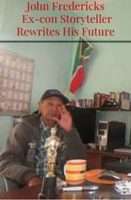Parents enjoy reminiscing about their childhoods and narrating them to their children. Now, imagine how fulfilling the narration would be if those stories were to be adapted into a film? Well, that’s more than just an imaginary scenario for seventy-year-old former offender, John Fredericks, from Strandfontein, in Cape Town.
Uncle John, as he’s known, will get to witness his life play out in cinemas in the film Noem My Skollie, from September 2016.
“In 2000 I wrote a lot of scripts, and Noem My Skollie was one of them. It’s been a long time coming and I believed all these years that the script would be this huge one day.” The film is set on the Cape Flats in the 1950s and revolves around four youngsters.
“In 2000 I was in Italy for my first ever documentary and I never believed that I could ever go overseas. I wrote many other stories and poems during my visit there, including a poem titled Mr Nobody. I realised that in South Africa I was nobody but in Italy I was somebody. The funny part was that they were amazed that I came from Africa. They had never seen a coloured South African before,” he chuckles.
John has also written well-received documentaries, such as Mr Devious and Hard Living Kids, with the latter winning a Best Documentary award in New York in 2005.
Today John is slouching on his chair at his office, puffing on his cigarette as he recollects his childhood, and his wife, jumps in whenever he misses a point. He recalls the first incident that landed him in jail.
“At seventeen we were caught inside a shop in Athlone, and the shop was near the police station. We had just come back from dancing. The alarm went off and the cops searched all over the shop and we hid in a room. We just knew we were going to jail. One of my friends asked if I had a cigarette. He just wanted to smoke for the last time!” He adds they were indeed caught and sentenced to two years in a juvenile detention centre.
John’s body may have been behind bars, but he remained mentally emancipated because his writing skills – already showing promise – grew even stronger.
“I started telling stories long before I went to prison, because I love writing. I was always a good storyteller among my friends. I used the people that I met there as my characters,” he remembers.
John’s childhood was filled with crime and gangsters, but that’s something that saved him from the lion’s jaws in prison.
“There was a [man] who used to tell us to buy him marijuana, and we were happy to do so cos he’d then tell us his stories and we learnt a lot from them. He’d warn about the things we should never do if we were in prison. You pay for everything there with your body. We learnt about the prison from outside, and we knew what to avoid when we went in.”
Sometimes, people will still touch the iron even after you warn them it’s burning hot. “My other friend knew that you can’t accept anything from anyone in prison but he disregarded that. One day he accepted a cake from someone [and was told] ‘You are sleeping by me tonight.’ At night the guy was screaming loudly, and you find yourself sleeping with one eye opened. You try hard not to fall asleep. Wardens don’t care. They just dump you there and leave.”
John told stories in jail, so that he could live to tell his own story outside prison.
“I also learnt from the outside you don’t have to take the so-called [gang] ‘number’. Rather push your time and get out. I asked if I can tell good stories instead of taking a number and they told me if my stories weren’t interesting then I’d be forced to take the number.”
He adds that his stories helped him see another day, every day. “Story-telling time came and they gathered and I sucked them out of my thumb. The audience would be my characters. They liked the stories and I had to tell them every day. Some tried telling stories to dodge the number but they never made it.”
However, his stories could only take him so far.
“We laid the foundation of that prison (Pollsmoor) with our sweat and tears, and built it with our own hands. We did hard labour, unlike now. These laaities are just sitting with computers and phones nowadays. We didn’t want to go back but these things catch up with you. You tell yourself you won’t come back but you know you’ve got to survive. Your childhood catches up with you because [hustling] is the only way you know.”
John may be too old now to be going around telling stories but he’s still reaping the fruits of the old ones he told way back then.
“I worked with youth in prisons, and with juveniles as a writing facilitator. Just two weeks ago on Facebook one guy asked me if I still remembered him. He said, ‘Fourteen years ago I attended one of your workshops. I was down and out, and had lost all hope in life. You changed my life forever. I’m working in the media today.’ I’m glad I could help him pick up the pieces.”
As someone who’s worked closely with the youth and seen it all, he has some advice for them.
“You don’t have to fight or belong to a gang. Humble yourself. When you do bad, all the doors close on you. I’m talking about heart doors. You are nothing if you are a criminal because nobody wants to associate with you. Your life is in your hands. You decide who you want to be,” he concludes.







 Well done and keep up with the good work
God will truly bless you
Well done and keep up with the good work
God will truly bless you 
